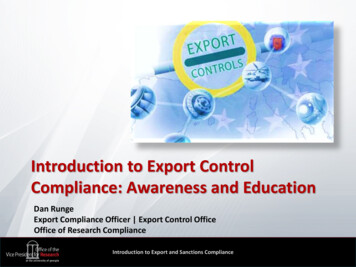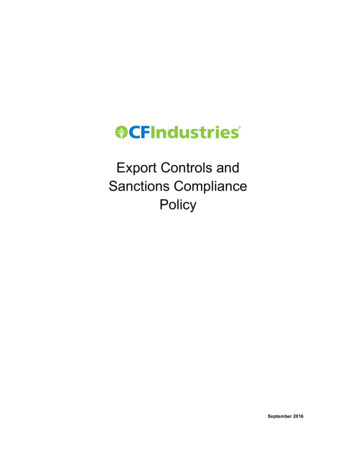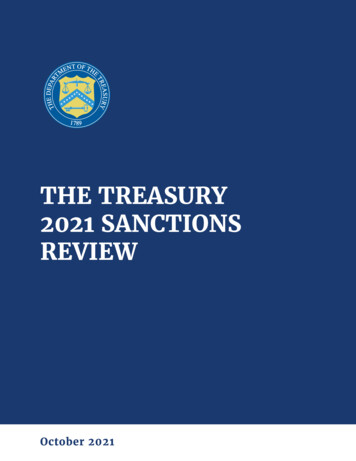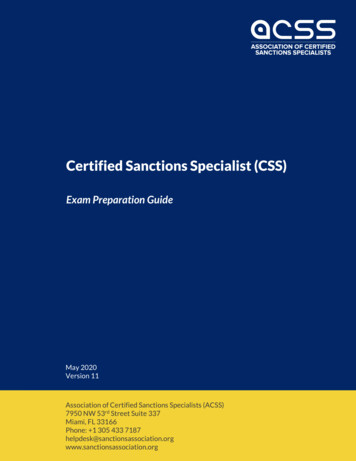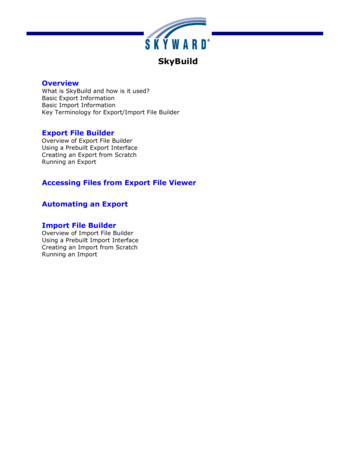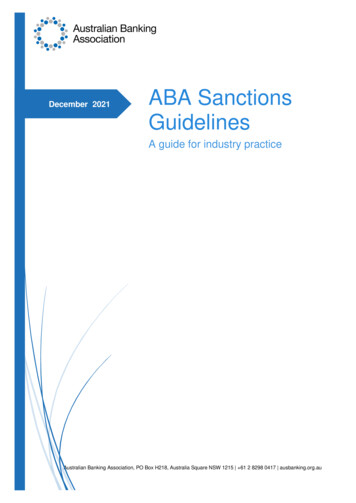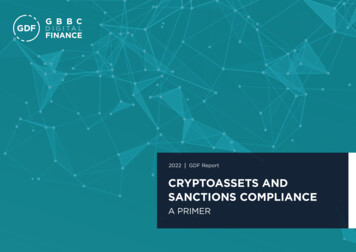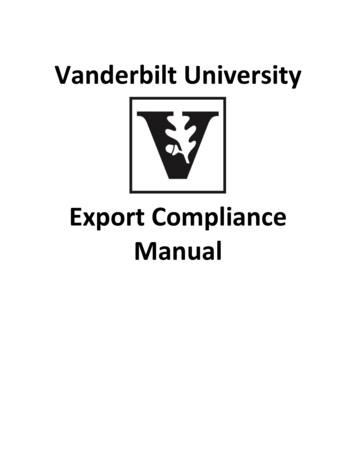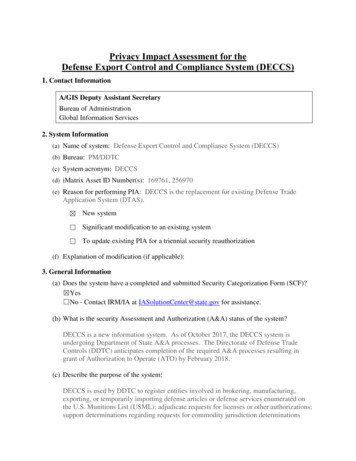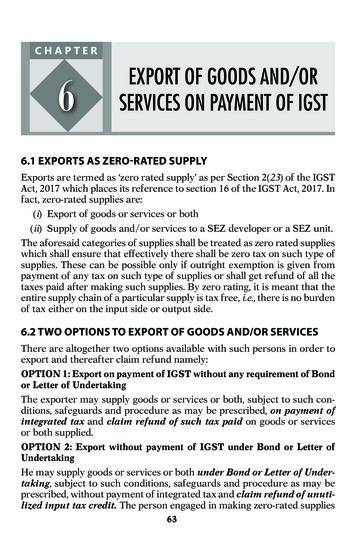
Transcription
Virginia Polytechnic Institute and State UniversityExport Control, Sanctions, and Research Security Compliance PolicyNo. 13045Policy Effective Date:8/24/2011Last Revision Date8/24/2020Policy Owner:John TalericoPolicy Author: (ContactPerson)Laurel MinerAffected Parties:UndergraduateGraduateFacultyStaffOther1.0 Purpose2.0 Policy3.0 Responsibilities4.0 Procedures5.0 Definitions6.0 References7.0 Approval andRevisions1.0 PurposeInnovation, research, and development of critical technologies are central to thetechnological superiority of the United States and to the protection of significant economicinterests of the country. Virginia Tech continues to expand its technological research andother collaborative efforts with foreign countries, their entities (e.g., universities,companies, or agencies) and their citizens. At the same time, Virginia Tech is also growingits research collaborations with industry and the federal government that are subject toexport or security restrictions.Academic research typically qualifies as fundamental research which normally may beconducted with international collaborators without export control licensing or securityrestrictions. However, there are certain conditions under which the export of criticaltechnologies and items is prohibited by law or require an export license or othergovernment approval. The presence of these activities at university facilities, both in theUnited States and abroad, increases the risk of violating federal laws and regulationsgoverning exports and international transactions. Violations of these laws are punishableby severe civil and criminal penalties and fines, including imprisonment.This policy has been enacted to establish, document, and implement procedures needed toensure that the university, and its employees and students, remain in full compliance withInternational Traffic in Arms Regulations (ITAR), Export Administration Regulations(EAR), Export and Import of Nuclear Equipment and Materials Regulations (EINEMR),Assistance to Foreign Atomic Energy Activities Regulations (AFAEAR), Foreign AssetsControl Regulations (FACR), National Industrial Security Program Operating Manual(NISPOM) and/or other applicable export control, sanction, or security related laws,regulations, or orders.2.0 PolicyIt is the policy of Virginia Tech to comply with applicable export, sanctions, and securityregulations in all university activities defined herein.2.1 Applicability of PolicyThis policy, its amendments and additions, apply to all university activities that may resultin an export or sanctioned transaction, protection and management of United StatesGovernment classified information under the National Industrial Security Program, andsafeguarding of Controlled Unclassified Information.Export Control, Sanctions, and Research Security Compliance Policy - No. 13045 - Page 1
Virginia Polytechnic Institute and State University2.2 Activities CoveredRegulated exports, sanctions, and security transactions subject to this policy include but are not limited to:EAR exports Shipment or transmission of commodities, software, or technology listed on the Commerce Control Listoutside of the United States.Release or transfer of technology or source code to a foreign person in the United States.Transferring of regulation, control, or ownership of a spacecraft subject to the EAR.Transactions that violate the General Prohibitions of the EAR.ITAR exports and Imports Shipment or transmission of a defense article outside of the United States, or temporarily importing adefense article.Release or transfer of technical data to a foreign person in the United States.Transferring registration, control or ownership of an aircraft, vessel, or satellite subject to the ITAR.Performing a defense service on behalf of, or for the benefit of, a foreign person.Importation of Arms, Ammunition and Implements of WarPermanently importing a defense article subject to the U.S. Munitions Import List.EINEMR and AFAEAR Exports and ImportsPhysically transferring nuclear equipment or material to a person or an international organization in a foreigncountry; or from a person or organization in a foreign country to the United States.Participating in activities or training, directly or indirectly, involving production of Special Nuclear Materials(SNM), sensitive nuclear technology, or involving production reactors, accelerator-driven subcritical assemblysystems, enrichment, reprocessing, fabrication of nuclear fuel containing plutonium, production of heavy water, orresearch reactors, or test reactors.FACR TransactionsConducting international collaborations or academic exchanges (e.g., financial transactions and exportation andimportation of goods and services of value) with sanctioned countries, entities, and individuals.National Security Related ResearchNational security related transactions involving the facility clearance, personnel clearances, and access to classifiedmaterials and equipment subject to the National Industrial Security Program Operating Manual (NISPOM), otherapplicable national security issuances, and Executive Orders for the protection of classified information. Theseregulations and orders comprise the National Industrial Security Program.Export Control, Sanctions, and Research Security Compliance Policy - No. 13045 - Page 2
Virginia Polytechnic Institute and State UniversityControlled Unclassified Information in ResearchResearch information subject to the Controlled Unclassified Information (CUI) program (Executive Order 13556and 32 CFR 2002) requires safeguarding from unauthorized release of said information. Examples of CUI subjectto this policy include, but are not limited to, Critical Infrastructure, Defense, Export Control, Intelligence, NorthAtlantic Treaty Organization (NATO), Nuclear, and Transportation. Protection of some types of CUI may besubject to other university policies.2.3 Export Control and Sanctions Management and Compliance ProgramThis Policy, the Virginia Tech Technology Control Plan, and subordinate procedures serve as Virginia Tech’sExport Control and Sanctions Management and Compliance Program.2.4 Industrial Security Compliance ProgramThis Policy, the Virginia Tech Technology Control Plan, and subordinate procedures serve as Virginia Tech’scompliance with the National Industrial Security Program.3.0 Responsibilities3.1 Office of Export and Secure Research ComplianceThe functional administrative unit at Virginia Tech that is charged with the responsibility for oversight ofcompliance for all activities covered by Section 2.2 of this policy is the Office of Export and Secure ResearchCompliance (OESRC). OESRC is under the supervision of the Senior Vice President for Research and Innovation.The Director of OESRC serves as Virginia Tech’s Empowered Official for compliance with the ITAR. AdditionalEmpowered Officials may be designed by the President. OESRC manages the Virginia Tech facility clearance andaccreditation of facilities necessary to conduct national security related academic and research activities. TheDirector of OESRC serves as Virginia Tech’s Facility Security Officer and Insider Threat Program Senior Officeras required by the NISPOM.3.2 Faculty, Staff, and StudentsVirginia Tech’s faculty, staff, and students are responsible for ensuring that their educational, research, and otherbusiness activities involving international collaborations and foreign exchanges are conducted properly and incompliance with U.S. export, sanctions, or security regulations and any procedures identified herein or in theTechnology Control Plan. If faculty, staff, or students are involved in classified research, controlled unclassifiedresearch, international collaborations, or foreign exchanges with risk of export control, sanction, or securityregulation violation, they will comply with the provisions of any license, government approval, policy, or OESRCdirected certification, technology control plan, or other procedure.4.0 Procedures4.1 Conducting Export Control, Sanctions and Research Security AssessmentsWhen requested or required by procedure, OESRC will assist Virginia Tech units, departments, and centers inexport control, sanctions and research security assessments to determine if activities are covered by Section 2.2 ofthis policy. Typical assessments include (i) whether or not an activity is restricted research or fundamentalresearch, (ii) a commodity jurisdiction determination (under what law an export is regulated), a commodityExport Control, Sanctions, and Research Security Compliance Policy - No. 13045 - Page 3
Virginia Polytechnic Institute and State Universityclassification determination (under what entry on the CCL the export is regulated and what nations/foreignnationals are restricted for export), (iii) a determination of whether an international collaboration or foreignexchange involves transactions subject to trade sanctions (including nationality and restricted party screening),and/or (iv) whether the activity involves national security or controlled unclassified information requirements.If an assessment concludes that an activity is subject to export control, sanctions, or security regulations, OESRCwill assist the affected party in seeking necessary licenses or other government approvals, and/or recommendsecurity measures (e.g., a transaction specific technology control plan) or other protocols (e.g., certifications)needed to ensure compliance.4.2 Communicating with and Obtaining Licenses or Other Government Approvals fromFederal AgenciesVirginia Tech cooperates with cognizant governmental and security agencies with licensing and law enforcementresponsibilities. The Director of OESRC serves as the university’s point of contact with those agencies. OESRCwill assist any Virginia Tech unit, department, or center, in filing for any license or other government approvalnecessary to conduct a university approved activity.4.3 Export Control and Sanctions Guidance for International Travel and InternationalVisitorsOESRC reviews Virginia Tech personnel international business travel and proposed business visits by internationalvisitors. Additionally, International Affairs and OESRC have established procedures that require OESRC review ofall foreign nationals who are not degree-seeking students enrolled at Virginia Tech. The OESRC provides exportand sanctions related guidance to internationally traveling personnel and sponsors of international visitors andemployees.4.4 Providing Awareness TrainingThe OESRC will consult with appropriate university administrative and academic units to assure provision ofinstructional resources considered necessary to the understanding of export, sanctions, and security regulations andimplementation of policy. These resources include written and web-based material, formal and informal courseofferings, and individualized consultation.OESRC offers in-person, with remote capability, export and sanctions compliance training upon request for faculty,staff, and students. Export and sanctions compliance training is also available online from the CollaborativeInstitutions Training Initiative (CITI). OESRC provides in-person, with remote capability, classroom training for allfaculty, staff, and students involved in conducting restricted research, and periodic awareness training tailored tospecific college, department, center, and administrative unit needs. Individuals enrolled in the National IndustrialSecurity Program are subject to security trainings as required by the applicable procedures.4.5 Conducting Institutional Self-AssessmentsThe OESRC will conduct periodic self-assessment of activities that are covered by Section 2.2 of this policy andreport its findings to the Senior Vice President for Research and Innovation, and the Vice Presidents forInternational Affairs or Finance, as appropriate.Export Control, Sanctions, and Research Security Compliance Policy - No. 13045 - Page 4
Virginia Polytechnic Institute and State University5.0 DefinitionsCommerce Control List - A list of “dual use” items, materials, software, and technology, subject to exportregulation, maintained by the Department of Commerce that can be used both in military and other strategic uses(e.g., nuclear) and commercial applications. In general, the term “dual use” serves to distinguish ExportAdministration Regulation -controlled items that can be used both in military and other strategic uses and in civilapplications from those that are weapons and military related use or design and subject to the controls of theDepartment of State or subject to the nuclear related controls of the Department of Energy or the NuclearRegulatory Commission.Controlled Unclassified Information (CUI) – Unclassified information designated by the U.S. Governmentexecutive branch that requires safeguarding or dissemination controls, pursuant to and consistent with applicableU.S. laws, statutes, regulations, Executive Orders, and U.S. Government-wide policies.Controlled Technical Information (CTI) –Controlled Technical Information means technical information withmilitary or space application that is subject to controls on the access, use, reproduction, modification,performance, display, release, disclosure, or dissemination. Controlled technical information is to be marked withone of the distribution statements B through F, in accordance with Department of Defense Instruction 5230.24,"Distribution Statements of Technical Documents."Deemed Export – Release of Export Administration Regulation regulated source code or controlled technology toa foreign national in the United States or abroad is “deemed” to be as if it were released to that foreign national’scountry of origin.Defense Article - Any item or technical data (these include military and commercial, navigational, researchsatellite and space related items, equipment, vehicles, instrumentation, software, and materials), designated by theDepartment of State in the International Traffic in Arms Regulations. This term includes technical data recorded orstored in any electronic or physical form, models, mockups or other items that reveal technical data directly relatingto items on the United States Munitions List. It does not include basic marketing information on function orpurpose or general system descriptions.Defense Service- Furnishing technical data or assistance (including training) to foreign persons (i.e., foreignnationals), whether in the United States or abroad in the design, development, engineering, manufacture,production, assembly, testing, repair, maintenance, modification, operation, demilitarization, destruction,processing or use of defense articles; or, military training of foreign units and forces.EAR – Export Administration Regulations are issued by the United States Department of Commerce, Bureau ofIndustry and Security (BIS) under laws relating to the control of certain exports, re-exports, and activities related todual use items on the Commerce Control List.Empowered Official – A U.S. person who is legally empowered in writing by the university to sign ITAR exportlicense applications or other requests for approval on behalf of the Virginia Tech; who understands the provisionsand requirements of the various export control statutes and regulations, and the criminal liability, civil liability, andadministrative penalties for violating the Arms Export Control Act and the International Traffic in ArmsRegulations.Export Control, Sanctions, and Research Security Compliance Policy - No. 13045 - Page 5
Virginia Polytechnic Institute and State UniversityThe Empowered Official has the independent authority to: (i) Enquire into any aspect of a proposed export ortemporary import by the applicant, (ii) Verify the legality of the transaction and the accuracy of the information tobe submitted; and (iii) Refuse to sign any license application or other request for approval without prejudice orother adverse recourse.FACR - Foreign Assets Control Regulations are issued by the US Department of the Treasury’s Office of ForeignAssets Control, which administers and enforces economic and trade sanctions based on US foreign policy andnational security goals against targeted foreign countries, terrorists, international narcotics traffickers, and thoseengaged in activities related to the proliferation of weapons of mass destruction.Foreign National- Persons who are not U.S. citizens, aliens who are not “Lawful Permanent Residents” (GreenCard), (8 USC § 1101(a)(20)) or other “Protected Individuals” under the Immigration and Naturalization Act (8USC §1324b(a)(3)) designated an asylee, refugee, or a temporary resident under amnesty provisions. A foreignnational also means any foreign corporation, business association, partnership or any other entity or group that isnot incorporated to do business in the US. Under ITAR, the term “foreign person” is used, but has the samedefinition as “foreign national” herein. However, for ITAR license determinations, foreign person citizenship isevaluated on the basis of country of birth, under the EAR, country of current (most recent) affiliation.Fundamental Research – “Basic and applied research in science and engineering, the results of which ordinarilyare published and shared broadly as distinguished from proprietary research and from industrial development,design, production, and product utilization, the results of which ordinarily are restricted for proprietary or nationalsecurity concerns.”-National Security Decision Directive 189ITAR –International Traffic in Arms Regulations are issued by the Department of State, which has responsibilityfor the control of the permanent and temporary export and temporary import of defense articles and services.National Industrial Security Program (NISP) – The National Industrial Security Program (NISP) is a partnershipbetween the federal government and private industry to safeguard classified information.National Industrial Security Program (NISPOM) – The National Industrial Security Program Operating Manual(NISPOM) establishes the standard procedures and requirements for all government contractors, with regards toclassified information. It covers the entire field of government-industrial security related matters. The NISPOMcomes in the form of DoD 5220.22-M “National Industry Security Program Operating Manual (NISPOM)”.Publication or Dissemination Restrictions –Acceptance in research and development of any prohibition orapproval authority over publication or any other dissemination of research results, excepting, sponsor orcollaborator.Restricted Parties - Individuals and entities with whom the university and its employees may be prohibited by law,or who require a license or other government approval, to export to or engage in controlled transactions. Theseincludes but is not limited to the Department of Commerce Denied Persons List, Entity List, and Unverified List;the Department of State Debarred Parties List and Designated Terrorist List; and the Department of TreasurySpecially Designated Nationals and Blocked Persons List.Restricted Research - University research, development, or testing subject to export controls, sanctions, controlledunclassified restrictions, and/or security controls. Research becomes restricted when the University accepts (i)publication restrictions, (ii) federally funded agreements with access and dissemination controls on the results, (iii)federally funded research agreements with contract specific national security restrictions; (iv) third party controlledExport Control, Sanctions, and Research Security Compliance Policy - No. 13045 - Page 6
Virginia Polytechnic Institute and State Universityitems or information, or (v) access to, or defense services on, a defense article. Restricted research may be subjectto EAR and ITAR regulations where a license or other government approval may be required for foreign nationalparticipation.Sanctioned Countries – Countries designated under the Foreign Access Control Regulations or through ExecutiveOrders as having limited or comprehensive trade sanctions imposed by the United States for reasons of antiterrorism, non-proliferation, narcotics trafficking, or other reasons.United States Munitions List - Articles, services and related technical data designated by the Department of State asdefense articles and defense services pursuant to the Arms Export Control Act.6.0 ReferencesArms Export Control Act22 U.S.C. Ch. 39Assistance to Foreign Atomic Energy Activities Regulations (AFAEAR)10 CFR §810Controlled Unclassified Information32 CFR §2002Controller’s Office Procedure 20335a Travel OverviewCritical Energy Infrastructure Information (CEII)18 CFR §388.112-113Critical Infrastructure Information (CII)6 U.S.C. 131-134CUI RegistryDDTC Compliance Program GuidelinesDoD Policy Memorandum Contracted Fundamental Research (May 24, 2010)Executive Order 13526 Classified National Security InformationExecutive Order 13556 Controlled Unclassified InformationExport Administration Regulations (EAR)15 CFR §§730-774Export Control Reform Act of 2018Export and Import of Nuclear Equipment and Material Regulations (EINEMR)10 CFR §110Foreign Assets Control Regulations (FACR)31 CFR §§500-599Importation of Arms, Ammunition and Implements of War27 CFR §447International Emergency Economic Powers Act (IEEPA)50 U.S.C Ch. 35 §1701 - §1708International Traffic in Arms Regulations (ITAR)22 CFR §§120-130National Industrial Security Program Operating ManualNational Security Decision Directive 189OSP Policy 29-05 Management of Restricted Research AgreementsProtected Critical Infrastructure Information (PCII)6 CFR §29Protection of Sensitive Security Information (SII)49 CFR §1520Secrecy of Certain Inventions and Licenses to Export (PTO)37 CFR §5Unclassified Nuclear Controlled Information (UNCI)42 U.S.C. 2168Virginia Tech Policy 12115 Accepting and Reporting Gifts-in-KindVirginia Tech Technology Control Plan7.0 Approval and RevisionsApproved August 24, 2011 by Vice President for Research, Robert W. Walters.Export Control, Sanctions, and Research Security Compliance Policy - No. 13045 - Page 7
Virginia Polytechnic Institute and State University Revision 1Revised to reflect current practice: Includes a reference to compliance with Importation of Arms, Ammunition and Implements of War insection 1.0 Added a paragraph on National Security Related Research in Section 2.2 Added detail about the facilities clearance and accreditation of facilities in Section 3.1. Added Section 4.3: Providing Export and Sanctions Guidance for International Travel and InternationalVisitorsApproved January 21, 2015 by Vice President for Research, Robert W. Walters. Revision 2 Revised for regulatory updates, including research security regulations. Technical updates to titlesApproved August 24, 2020 by Executive Vice Provost, G. Don Taylor.Export Control, Sanctions, and Research Security Compliance Policy - No. 13045 - Page 8
Control Regulations (FACR), National Industrial Security Program Operating Manual (NISPOM) and/or other applicable export control, sanction, or security related laws, regulations, or orders. 2.0 Policy It is the policy of Virginia Tech to comply with applicable export, sanctions, and security regulations in all university activities defined herein.
